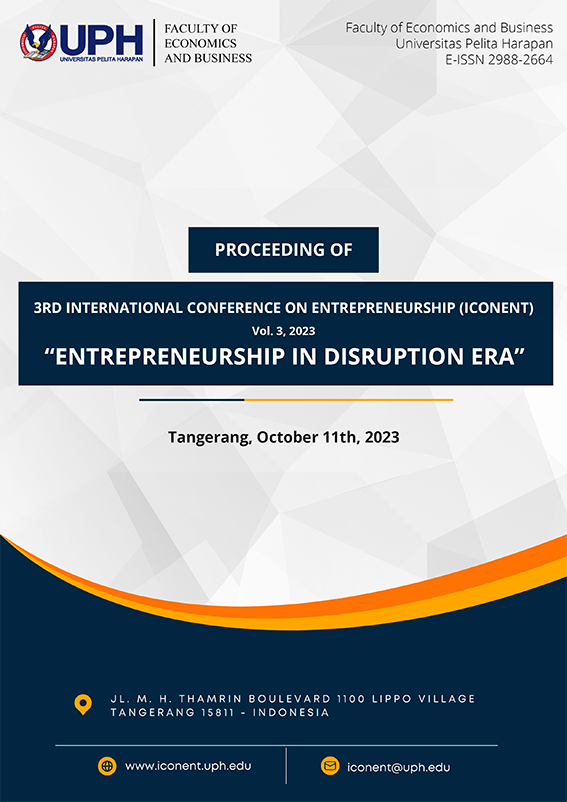Intention to Venture Creation versus Self-Employment: Insights from Intracurricular-Based and Cocurricular-Based University Students
Kata Kunci:
attitude, subjective norm, perceived behavioral control, intention to venture creation, intention to self-employmentAbstrak
Indonesia presently has a low entrepreneurship rate of 1.65%, which falls short of the benchmark for a developed nation. One of the key reasons behind this challenge is the imperative to cultivate tremendous enthusiasm for entrepreneurship among university students. Assessing this interest in entrepreneurship can be accomplished through the Theory of Planned Behavior (TPB), which encompasses components like attitude, subjective norm, and perceived behavioral control. The primary objective of this study is to scrutinize how these three variables influence the intentions of university students majoring in entrepreneurship and students who learn entrepreneurship regarding venture creation (IVC) and self-employment (SE). The sample for this research was chosen using a purposive sampling technique, resulting in 188 valid respondents. The data was subsequently analyzed using the Partial Least Squares Structural Equation Modeling (PLS-SEM) method with the assistance of Smart PLS. This research reveals that attitude significantly impacts students' intentions in both venture creation and self-employment. While subjective norm does not affect students' inclination toward venture creation, it does influence their interest in pursuing self-employment. Finally, perceived behavioral control shapes students' tendencies toward venture creation but does not influence their intentions for self-employment.
Referensi
Achmad, Z. (2010). Theory of Planned Behavior, Masihkah Relevan? Diambil Dari: Http://Zakarija. Staff. Umm. Ac. Id/Files/20, 12. http://zakarija.staff.umm.ac.id/files/2010/12/Theory-of-Planned-Behavior
Ajzen, I. (1991). The theory of planned behavior. Organizational Behavior and Human Decision Processes, 50(2), 179-211. https://doi.org/10.1016/0749-5978(91)90020-T
Ajzen, I. (2011). The theory of planned behaviour: Reactions and reflections. Psychology and Health, 26(9), 1113-1127. https://doi.org/10.1080/08870446.2011.613995
Chrismardani, Y. (2016). THEORY OF PLANNED BEHAVIOR SEBAGAI PREDIKTOR INTENSI BERWIRAUSAHA. Competence : Journal of Management Studies, 10(1). https://doi.org/10.21107/KOMPETENSI.V10I1.3426
Farazila Radzi, N. (2019). Factors Influencing Entrepreneurship Intention Among Students. Jurnal Kejuruteraan, Teknologi Dan Sains Sosial, 1(1), 9-17.
Ferreira, J. J., Raposo, M. L., Rodrigues, R. G., Dinis, A., & do Paço, A. (2012). A model of entrepreneurial intention: An application of the psychological and behavioral approaches. Journal of Small Business and Enterprise Development, 19(3), 424-440. https://doi.org/10.1108/14626001211250144/FULL/XML
Hair, J. F., Risher, J. J., Sarstedt, M., & Ringle, C. M. (2019). When to use and how to report the results of PLS-SEM. European Business Review, 31(1), 2-24. https://doi.org/10.1108/EBR-11-2018-0203
Hansfel, L., & Puspitowati, I. (2020). Pengaruh Attitude, Subjective Norm dan Perceived Behavior Control terhadap Entrepreneurial Intention. Jurnal Manajerial Dan Kewirausahaan, 2(4), 985. https://doi.org/10.24912/jmk.v2i4.9881
Indarti, N., & Rostiani, R. (2008). INTENSI KEWIRAUSAHAAN MAHASISWA: STUDI PERBANDINGAN ANTARA INDONESIA, JEPANG DAN NORWEGIA 1. Jurnal Ekonomi Dan Bisnis Indonesia, 23(4), 369-384.
Kemenperin: Indonesia Butuh 4 Juta Wirausaha Baru untuk Menjadi Negara Maju. (n.d.). Retrieved October 9, 2023, from https://www.kemenperin.go.id/artikel/19926/Indonesia-butuh-4-juta-wirausaha-baru-untuk-menjadi-negara-maju
Kewirausahaan UMKM dan Pertumbuhan Ekonomi | Sekretariat Negara. (n.d.). Retrieved October 9, 2023, from https://www.setneg.go.id/baca/index/kewirausahaan_umkm_dan_pertumbuhan_ekonomi
Levine, R., Rubinstein, Y., Thank, W., Angrist, J., Davis, S., De Meza, D., Gertler, P., Gilboa, I., Heider, F., Hurst, E., Juhn, C., Lazear, E., Lusardi, A., Nanda, R., Popov, A., Poterba, J., Van Reenen, J., Robinson, D., Wang, F., & Yuchtman, N. (2018). Selection into Entrepreneurship and Self-Employment. https://doi.org/10.3386/W25350
Lortie, J., & Castogiovanni, G. (2015). The theory of planned behavior in entrepreneurship research: what we know and future directions. International Entrepreneurship and Management Journal, 11(4), 935-957. https://doi.org/10.1007/S11365-015-0358-3/METRICS
Mafabi, S., Nasiima, S., Muhimbise, E. M., Kasekende, F., & Nakiyonga, C. (2017). The mediation role of intention in knowledge sharing behavior. VINE Journal of Information and Knowledge Management Systems, 47(2), 172-193. https://doi.org/10.1108/VJIKMS-02-2016-0008/FULL/XML
Malebana, M. J. (2021). The Effect Of Entrepreneurial Motivation On Entrepreneurial Intention Of South African Rural Youth. Academy of Entrepreneurship Journal, 27(SpecialIssue 3), 1-14.
Mothibi, N. H., & Malebana, M. J. (2019). Determinants of entrepreneurial intentions of secondary school learners in Mamelodi, South Africa. Academy of Entrepreneurship Journal, 25(2), 1-14.
Murugesan, R., & Jayavelu, R. (2015). Testing the impact of entrepreneurship education on business, engineering and arts and science students using the theory of planned behaviour: A comparative study. Journal of Entrepreneurship in Emerging Economies, 7(3), 256-275. https://doi.org/10.1108/JEEE-12-2014-0053/FULL/XML
Nooriah Yusof, & Zakiyah Jamaluddin. (2017). Graduate employability and preparedness: A case study of University of Malaysia Perlis (UNIMAP), Malaysia. Geografia - Malaysian Journal of Society and Space, 11(11), 129-143.
Purusottama, A., & Akbar, T. F. (2019). An Entrepreneurship Education Model for Promoting Students’ Entrepreneurial Intentions: The Case of Indonesian Higher Education. Indonesian Journal of Business and Entrepreneurship, 5(2), 138-147. https://doi.org/10.17358/ijbe.5.2.138
Putra, B. P. (2018). Peningkatkan Jumlah Wirausahawan Di Indonesia Melalui Kolaborasi Akademisi-Pelaku Usaha-Mahasiswa Bintang Paula Putra. Economicus, 12(1), 63-71.
Rauch, A., & Hulsink, W. (2015). Putting Entrepreneurship Education Where the Intention to Act Lies: An Investigation Into the Impact of Entrepreneurship Education on Entrepreneurial Behavior. Https://Doi.Org/10.5465/Amle.2012.0293, 14(2), 187-204. https://doi.org/10.5465/AMLE.2012.0293
Said, I. N., & Iskandar, D. D. (2020). Entrepreneurship Monitor ( GEM ) mengenai minat berwirausaha di Indonesia juga menunjukkan kecenderungan minat. Jurnal Pemikiran Dan Penelitian Administrasi Bisnis Dan Kewirausahaan, 5(2), 201-211.
Santy, N., Rahmawati, T., & Hamzah, A. (2017). Pengaruh Efikasi Diri, Norma Subjektif, Sikap Berperilaku Dan Pendidikan Kewirausahaan Terhadap Intensi Berwirausaha. Jurnal Inspirasi Bisnis Dan Manajemen, 1(1), 63. https://doi.org/10.33603/jibm.v1i1.481
Simanihuruk, P., Tamba, D., & Sagala, R. (2021). PENGARUH SIKAP, NORMA SUBYEKTIF DAN KONTROL PERILAKU YANG DIRASAKAN TERHADAP MINAT BERWIRAUSAHA DENGAN PENDEKATAN THEORY OF PLANNED BEHAVIOUR (Studi Kasus Pada Mahasiswa Fakultas Ekonomi Unika Santo Thomas Medan). Jurnal Manajemen Dan Bisnis, 20, 98-112. https://doi.org/10.54367/jmb.v21i1.1189
Solesvik, M. Z., Westhead, P., Kolvereid, L., & Matlay, H. (2012). Student intentions to become self-employed: The Ukrainian context. Journal of Small Business and Enterprise Development, 19(3), 441-460. https://doi.org/10.1108/14626001211250153/FULL/XML
Soomro, B. A., & Shah, N. (2022). Entrepreneurship education, entrepreneurial self-efficacy, need for achievement and entrepreneurial intention among commerce students in Pakistan. Education + Training, 64(1), 107-125. https://doi.org/10.1108/ET-01-2021-0023

 Fakultas Ekonomi dan Bisnis | Universitas Pelita Harapan | Kampus Universitas Pelita Harapan | Gedung F Lt. 12 | Lippo Karawaci, Tangerang - 15811 | Telp 021-5460901 | Fax 54210992
Fakultas Ekonomi dan Bisnis | Universitas Pelita Harapan | Kampus Universitas Pelita Harapan | Gedung F Lt. 12 | Lippo Karawaci, Tangerang - 15811 | Telp 021-5460901 | Fax 54210992